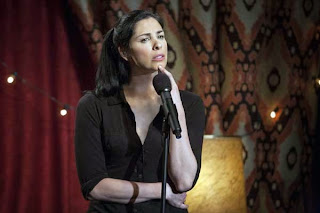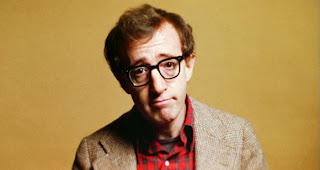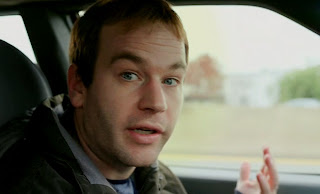 |
| Image via LA Times |
The old insult goes, “Jews run show business.” To that I say “thanks.”
Jews make up about 0.2% of the world’s population yet they have always been a loud (emphasis on the loud) and prominent voice in film, television, music, and comedy.
The next eight days are Hanukkah, which is not the most important Jewish holiday, but we do get presents. For each night of Hanukkah, I will share one Jewish entertainer who has had a big impact on me. For the fifth night of Hanukkah, let’s talk about Sarah Silverman:
Of all of the best living comedians, Sarah Silverman might be taken for granted more than anybody else.
Silverman is basically a household name at this point, yet she has been plagued by some brilliant “failures” as well as a long history of being underrated. That’s okay, though, because she keeps doing what she just does best: providing laughs, as well as offense to those who feel the need to fall into that trap.
The phrase “Female Jewish Comedian” seems to go hand-in-hand with Sarah Silverman. This is true despite the fact that Silverman always says that she never grew up religious. Yet, as she says herself in her wonderful new special “We Are Miracles,” she just cannot separate herself from that image. Without her Jewish side, her sense of humor would never be the same.
Along with “Female Jewish Comedian,” the words “dirty” “vulgar” and “offensive” get tossed along with Silverman, too. However, she is the most misunderstood dirty comic out there. Those who claim that she is offensive for the sake of being offensive are unfortunately the overwhelming majority, and they seem to miss just how layered her act is. In her act, she’ll drop the c-bomb followed by a huge smile as if she’s a child who just figured out how to swear for the first time. Everything she says is delivered with the subtlest of winks.
On her brilliant but short-lived “Sarah Silverman Program,” Silverman took her stand-up act into scripted territory and constantly redefined what it meant to cross the line. In one episode, she bets a black man that being a Jewish woman is even more difficult, so the two switch lives for a day. When she puts on blackface, she thinks that people are booing her because she is black but in reality it’s because, well, she’s wearing blackface. Silverman has found a way to turn offensive jokes into self-deprecating humor. She is clearly playing a goof much different than who she really is. The joke is always on her. Silverman can make this work because when speaking candidly, she comes off as so kind and sincere. Just read her heartwarming memoir “The Bedwetter,” which I hope is one day turned into a movie.
In addition to her comedic sensibility, Sarah Silverman is also a model cultural Jew. She shows that being a Jew is about much more than believing in God or the Ten Commandments (downgraded from fifteen). If someone is born Jewish, they remain Jewish so long as they feel that way and choose to continue to identify with it. Silverman represents every friend you have ever had who cannot help but bring up Jewish things constantly in conversation because their sense of identity is so overwhelming.
The point is that you can Anglicize your name as much as you want (*cough* Winona Ryder *cough* where’s my inhaler?), but your Jewishness does not simply disappear. Sarah Silverman, like any good comedian who finds something funny, embraces it and then owns the hell out of it.








